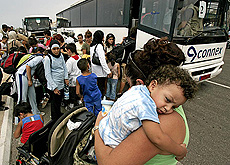
Swiss Lebanese express their indignation

Members of the Swiss Lebanese community are consumed by a rising sense of injustice as a result of Israel's military offensive in Lebanon.
Some focus their anger by collecting money to help their fellow countrymen in Lebanon. While others, who were repatriated to Switzerland, cannot stop thinking about those they left behind.
Several tens of thousands of foreigners have been evacuated from Lebanon since the start of the Israeli offensive on July 12.
Abdallah El-Chami and his two children, Marwan and Samir, from Marin near Neuchâtel, are among the more than 850 people who were repatriated to Switzerland.
Like every year, they travelled to the Middle East to spend their summer holidays with relatives in a small village some ten kilometres from Nabatiyeh, in southern Lebanon.
“We arrived there on July 9, if I remember rightly, the day of the World Cup Final. Three days later the war started,” explained Chami.
Initially he thought the Israeli offensive was just another reply to Hezbollah’s attacks. “I told my children they were fireworks,” he said.
Military aircraft then began to bomb roads and buildings. Four houses were destroyed in the Chami family village. Chami realised that the offensive was more serious than he had first imagined. And his children did not really understand what was going on.
“They got scared when they saw women and children crying. That was when they got it. I then explained to them that it was a war. Samir’s heart was beating very strongly,” he added.
Unbearable
At the same moment back in Switzerland, Bilal El-Kassab was watching the first images on television of Israel’s assault.
“Initially I thought it was all a nightmare and I was going to wake up,” recalls the resident of the capital, Bern.
“It was incredible. Several days earlier I was trying to reserve a plane ticket to Lebanon. All my friends [over there] were telling me to come and visit as there was a great new disco that had just opened. Then the airport suddenly closed because the runways had been bombed,” he explained.
Kassab says he is angry and feels a sense of injustice.
“We have struggled to rebuild the country and restore a sense of normality. We thought that all this was over, war was behind us and we were going to welcome groups of tourists and the economy would improve. We are now suddenly back in the worst moments of the conflict.”
Flee
For the Chami family, the journey out of Lebanon was a long and frightening one. He knew he had to get his children back to Switzerland.
He tried to leave the village, but roads were blocked, bridges destroyed and bombs raining down. He said he momentarily gave up hope before deciding to call the Swiss embassy in Beirut.
“They were extremely kind, but they explained that we were too isolated. They couldn’t reach us,” he explained.
The embassy advised them to go to Nabatiyeh. The family took a taxi accompanied by a local resident.
“The bombs landed in front of us, but I knew we had to continue. Instead we took small mountain roads,” he recalled. Three days later Abdallah, Samir and Marwan finally arrived in Beirut.
Return
Once in the Lebanese capital the embassy organised their evacuation by bus to Damascus in Syria, where a flight was waiting to take them to Switzerland. The following day they were welcomed back in Switzerland by their family at Neuchâtel train station.
“We feel safe here. The first day was quite difficult for Samir and Marwan. Now things are better. They go swimming and play with their friends. The nightmare is over for them. Normal life has returned,” said Chami.
Although he is personally relieved for his children, he is now constantly glued to his television set and cannot stop thinking about the people who are still there in Lebanon: “those under the bombs and the children who are helpless”.
Shock
“We’d already experienced war before, but it wasn’t the same,” said Chami. “This time it was much more aggressive; in four or five days they launched the same number of bombs as on Iraq.”
Kassab was also struck by the suddenness and intensity of the Israeli offensive.
“The damage was done in a short space of time,” he commented.
To channel his anger and frustration he is trying to make himself useful.
“We have collected money at work that we are going to donate to Médecins Sans Frontières in Lebanon. We are also collecting medicines. But as long as the country is under a sea and air embargo, it’s difficult to send aid to those in need,” he adds.
swissinfo, Alexandra Richard
The fighting – the worst since Israel invaded southern Lebanon in 1982 – was triggered after Hezbollah seized two Israeli soldiers in a cross-border raid two weeks ago.
The Islamic militant movement is part of the Lebanese government and is backed by Syria and Iran.
The fighting has killed at least 423 people in Lebanon and 51 in Israel.
Aid experts estimate that some 800,000 people have been displaced and need shelter, water as well as medical assistance and care.
The government has now unblocked a total of SFr6.5 million for emergency aid of the Geneva-based International Committee of the Red Cross. (ICRC)
The Swiss foreign ministry has helped 875 people leave Lebanon – 795 Swiss and 80 other nationals with residence in Switzerland. A further 215 Swiss did not wish to leave.
The evacuation programme has so far cost SFr2.5 million.

In compliance with the JTI standards
More: SWI swissinfo.ch certified by the Journalism Trust Initiative

























You can find an overview of ongoing debates with our journalists here . Please join us!
If you want to start a conversation about a topic raised in this article or want to report factual errors, email us at english@swissinfo.ch.